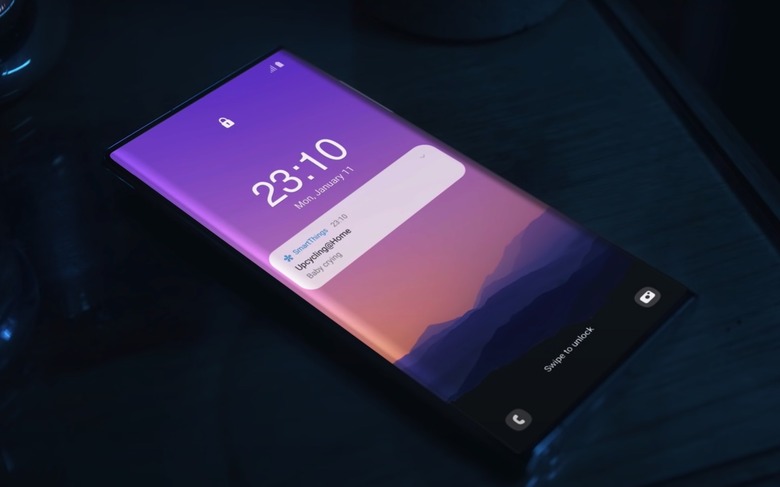Samsung Is Fighting A Hidden War To Protect Its Secrets
- A report from South Korea illustrates the unseen tech war between Samsung and China.
- Samsung has strict practices to prevent employees from stealing sensitive information that could be sold to Chinese companies.
- China is targeting Samsung engineers with better job offers.
- The report notes that the South Korean government is also involved in protecting what it sees as "national core technologies" from reaching China, including the OLED displays that Samsung makes for Galaxy phones and iPhones.
It's a known secret in the mobile industry that Samsung can't prevent Galaxy leaks. All of its phones leak months ahead of release, with little mystery left for the actual Unpacked press conferences where the next-gen Galaxy S, Note, or Fold is unveiled. The Galaxy S21 went through the same process in the months preceding the mid-January announcement. Perhaps it's just a case of Samsung not really caring enough to really prevent those leaks.
The leaks might ruin the surprise, but the hype can help with sales even if the mystery is lost. While Samsung might seem complicit to some extent with those leaks, it turns out the company is fighting what appears to be a fierce war against the kind of leaks that matter far more, leaks that could hurt its bottom line.
Unbeknownst to most people, Samsung is under attack from China, where local companies target Samsung employees with lucrative job offers. Also, corporate espionage campaigns attempt to steal trade secrets from key sectors where Samsung has immense expertise. This includes Samsung's OLED tech that's used in Galaxy phones and iPhones alike, as well as Samsung's semiconductor business.
Nikkey Asia explains in a detailed report that the South Korean government is very much aware of the corporate espionage, helping local companies guard their tech secrets. The report focuses on Samsung, but Chinese companies are also targeting other South Korean companies, like LG.
In the five years ending in 2019, 123 cases of tech leaks from South Korea were recorded, according to data from the nation's top intelligence agency, the National Intelligence Service (NIS). Most of those leaks (83) went to China, many involving technologies where South Korean companies have a lead on competitors, including semiconductors, displays, and shipbuilding.
Three men were caught last August attempting to leak Samsung OLED secrets to China. They are currently facing at least three years in prison as a result, according to the report.
Samsung has strict security practices in place to prevent employees from stealing sensitive data. The camera and audio-recording functions of smartphones belonging to employees are disabled in labs and factories. The printing paper at one laboratory includes metal foil so metal detectors placed at the doors will prevent employees from leaving with sensitive information. Samsung also forbade employees from taking documents with technical data out of the office during the novel coronavirus pandemic, even though many people were working from home.
But Samsung can't force employees to stay at their jobs. Samsung has a workforce of over 287,000 workers worldwide, and headhunters from China are targeting these individuals with better job offers. Nikkei explains:
Openings posted on online job-hunting sites in South Korea often include such phrases as "Work location: inland region of China" or "Wanted: workers from display-related companies," alongside the promise of "favorable treatment for workers from companies S and L."
The S and L stand for Samsung and LG. The employees who do accept job offers in China attempt to hide that they're working in China. Some adopt aliases to keep authorities and former employers from tracing them. And they might use particular routes to return home, like flying from Hong Kong or Shanghai, busy destinations that allow them to blend in.
The report notes that Chinese display maker BOE, which has been vying for Apple's iPhone business for years, has hired around 120 South Koreans, including more than 50 former Samsung engineers who led the development of OLED screens for the iPhone. A BOE plant in Chengdu has production lines set up just like Samsung Display's main plant in South Korea. BOE supplies OLED screens for the iPhone repair market, but it's not a certified iPhone screen provider. The South Korean government has designated OLED technologies as "national core technologies," with NIS having a section dedicated to making sure those secrets stay in Korea.
The report also notes that China's Semiconductor Manufacturing International Corp. (SMIC), which is on a US government blacklist, has also hired many South Koreans, with at least 62 people appearing in SMIC-related patents. Headhunting of Samsung employees with expertise in chip production tech has increased just as the US-China tech tensions started heating up.
The full Nikkei story is available at this link.
